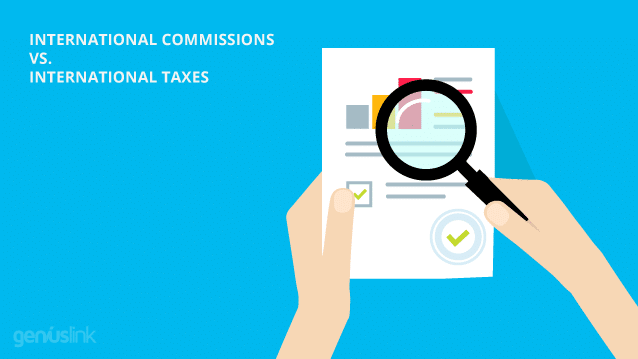International Affiliate Commissions vs. International Taxes
-
Jesse is a Native Montanan and the co-founder and CEO of Geniuslink - or, as he likes to say, head cheerleader. Before Jesse co-founded Geniuslink, he was a whitewater rafting guide, worked at a sushi restaurant, a skate/snowboard shop, was a professional student, and then became the first Global Manager at Apple for the iTunes Affiliate Program.
- September 12, 2023
As affiliate marketers, the first time we see an international payment come through our initial thought is often excitement. Wondering if the US has a tax treaty with said country and if their IRS equivalent is also going to want some portion of our hard earned commissions isn’t typically something that crosses our mind.
Until it does. Then the dread of not knowing where to start and the fear of what we’ll find kicks in and we are back to optimizing for EPC.
I’m happy to report that we’ve gone through exactly this cycle (multiple times) but are fortunate enough to work with a really talented Certified Public Accountant here in Seattle (Jessica Allen @ Sunrise Accounting). So we asked her the hard question – What’s the story with taxes and earning international commissions?
You are going to love her answer, but first, it’s super important to note that:
This is a general discussion of tax reporting rules and not tax advice for any specific individual or business. While we love our CPA there are lots of rock stars out that so we strongly encourage you to find and engage with a tax professional for advice regarding your specific situation. The tax impact of non-US source commission income depends on your whole picture: other income, filing status, business structure, etc.
The Short Answer
Okay, so the short answer is actually pretty simple. The gist is that if you are purely US-based and are primarily using Amazon’s international affiliate programs then you really don’t have anything to worry about. You would treat the international commissions as regular revenue and don’t have to stress about double taxation.
While we’ll use Amazon’s array of international affiliate programs as a general filter of which countries to focus on, this information is directly applicable to earning commissions for other international affiliate programs based in those same countries.
11 of the 12 countries that have international affiliate programs for Amazon (Canada, Mexico, the UK, France, Germany, Italy, Spain, India, China, Japan, and Australia) have US income tax treaties which prevent double-taxation. The 12th, Brazil, doesn’t have a formal treaty but has officially recognized income tax reciprocity with the US to prevent double-taxation.
However, it’s good to take note that some of the Amazon storefronts aren’t actually operated out of the country they are for. For example, it appears that the Amazon affiliate programs in Europe have language in their Operating Agreement that indicate they actually fall under the laws of Luxembourg (section 19, disputes) and the Amazon.ca Associates program mentions it falls under Washington state laws in the US (section 10, disputes).
Okay, and we can leave it there… Oh, this is kind of interesting? You want to learn more? Well then keep reading!
The “Nexus” Tangent
The slightly longer answer is that it’s super important to differentiate affiliate commissions between other international income.
For example, Fulfillment By Amazon (FBA) sellers actually qualify for nexus in most foreign countries, whereas affiliates typically have no physical presence or foreign-source income. If nexus is triggered in any of these countries, then an income tax filing is required in that country. Typically, if there is no nexus, the revenue is passive, or the commission/income is paid from a US company, like Amazon, then it is US-source income and the foreign tax filings are not applicable. But of course, the devil is in the details.
Okay, so what is “nexus”? “Nexus” essentially means you have some sort of tangible connection or presence in some other region (another state or country). Again, it’s really not relevant for international affiliates, but it’s an important concept you’ve probably heard before so it’s definitely worth mentioning in an article about Amazon affiliate marketing and taxes.
Early on Amazon was concerned about causing nexus in different states across the US by having Amazon affiliates based in said states. Some of you you might remember when living in California, Maine or Colorado or another dozen or so states meant you couldn’t be an Amazon Associate.
The logic was that if an affiliate lived in a state then Amazon had a tangible connection with that state. This then meant that states could then require Amazon to charge sales tax in those states. This then would lead to more money for the states but also meant an increase in prices for consumers in that state buying from Amazon and this was during a time period where Amazon’s strategy was to be the cheapest option and avoiding sales taxes helped them with that.
The challenge with Nexus is that it’s very complicated and varies. For example:
Principle of Economic or Substantial Nexus: The right of any taxing jurisdiction to impose a tax and/or reporting requirement on an individual, business, organization, or other entity that operates an activity within the agency’s jurisdiction. All cities, counties, states, countries, provinces, etc have particular and differing rules of nexus. Many require sufficient physical presence to trigger nexus, but some are as general as any activity that generates source revenue from their jurisdiction (like California, for example).
While even more, nuanced, the same basic idea applies with having nexus in other countries. If you have some sort of presence in another country, then that country would like to tax you for some portion of the revenue you generate in their country. But the opposite is often true if you don’t have any sort of presence you are typically fine (again, this gets complicated fast and a good CPA is worth their weight in gold reviewing your specific situation).
The Long Answer
Thankfully the IRS is pretty well organized and has a great resource on all of the tax treaties we have internationally. If you need something to put you to sleep you can start clicking around from here – United States Income Tax Treaties – A to Z.
But buried deep is exactly the information we need to know. Let’s break it down by country.
Canada
Even though there is a US-Canada Tax treaty, they generally require an income tax return to be filed when a business has reported having paid you Canadian source income.
Which tax return to file depends on if it’s an individual who is earning the commissions or a business entity. Personal income tax return will be required if you have income from sources in Canada.
On the non-resident return, there’s a place to report what you have reported in duplicate in the US and the tax you paid, in order to prevent double taxation on the same income.
A business entity that doesn’t have a physical presence, but again receives income from sources in Canada must file a T2 business tax return and there is a place to report what has been reported already and paid taxes on in the US to prevent double-taxation.
However, it’s important to know that Amazon Canada’s affiliate program doesn’t actually appear to be run out of Canada, but rather the US.
So, while they may pay out commissions in Canadian dollars there doesn’t appear to be a need to file paperwork with the Canadian government – again, we definitely encourage you to work with your CPA for your specific situation.
Mexico
If you are a non-resident of Mexico, but earning Mexico-sourced income, and if you can prove residency of your foreign tax home, then you will only be taxed once on your Mexican source income. There is a US-Mexico tax treaty in place to prevent double-taxation.
Similar to Canada, it appears that using the Amazon Mexico affiliate program will net you commissions in Mexican pesos the affiliate program actually references it’s existing being in the US (see section 19, Disputas of the Associates Acuerdo Operativo).
Europe (UK, France, Germany, Italy and Spain) & Australia
The same general rules apply to the UK as in Mexico, as well as France, Germany, Italy, Spain and Australia. A non-resident will be taxed on their source income in these non-US countries and exempted from other world-wide income. The US has tax treaties with all of these countries as well as to prevent double-taxation and improve compliance.
Brazil
For non-residents and foreign business entities, the income that comes from Brazilian sources is taxed at rates between 15-25% depending on the type of income. The US requires reporting and taxation of worldwide income, accepting the foreign earned income exclusion amounts allowed. If we’re only looking at passive commission income, then it will not qualify as “earned” income for this exclusion in the US.
Brazil and the US do not have an official tax treaty in place, however, Brazil has officially recognized the reciprocity of tax treatment with the US, the UK, and Germany, permitting the offsetting of tax paid in these countries against tax due in Brazil.
India
India is similar to the set up in Europe for tax the income that non-residents receive sourced from these countries, but it’s more complex with exceptions, exemptions, special rates for business types and whether or not the profits are held in Indian financial institutions. There is a US-India tax treaty in place to prevent double taxation.
China
China has more than 10 different categories of income and taxes each accordingly using progressive tax rates (like the US: example—the first $10,000 is taxed at %10, then the next $25,000 is taxed at 15%, then the next $40,000 is taxed at 25%, etc. and so on). Corporations have compliance and regulation requirements in addition to a corporate income tax. Like most of the countries on this list, a non-resident earning China-sourced commissions will be taxed on that income and not their entire world-wide income in that country. The US-China income tax treaty eliminates double taxation.
Japan
Per US-Japan tax treaty Article 8, profits are taxable only if the US resident also has a permanent establishment in Japan. Per treaty Article 6 under the 1945 convention, if the US resident pays tax on Japanese source-income, then the taxpayer will be allowed a credit for that tax paid, providing relief from double-taxation.
Please keep in mind
This article is meant to be a conversation starter.
We are not tax experts, so of course, we do recommend that you meet with your CPA or attorney to figure out exactly what your tax situation might be. Hopefully, this can serve as a good starting point in your research.
Thank you.
Author
-
Jesse is a Native Montanan and the co-founder and CEO of Geniuslink - or, as he likes to say, head cheerleader. Before Jesse co-founded Geniuslink, he was a whitewater rafting guide, worked at a sushi restaurant, a skate/snowboard shop, was a professional student, and then became the first Global Manager at Apple for the iTunes Affiliate Program.
Author
-
Jesse is a Native Montanan and the co-founder and CEO of Geniuslink - or, as he likes to say, head cheerleader. Before Jesse co-founded Geniuslink, he was a whitewater rafting guide, worked at a sushi restaurant, a skate/snowboard shop, was a professional student, and then became the first Global Manager at Apple for the iTunes Affiliate Program.
Related posts

What is a Geni.us Link?

Building Diverse Income Streams with Doug Cunnington

Building Wealth Through Video with Matt Hughes

Can you Include Affiliate Links in Emails?
More revenue from every link you share
Geniuslink makes localizing, tracking, and managing smart links dead simple, so you can earn more without added work.

